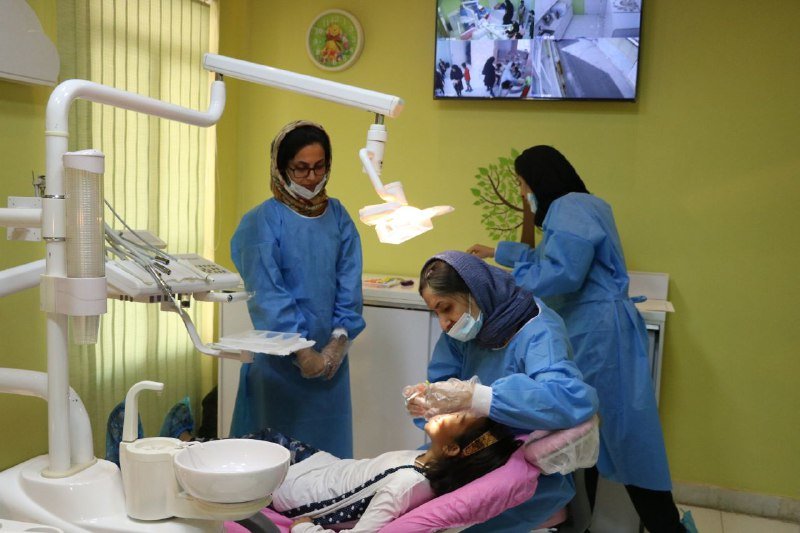Social responsibility on the rise among doctors
It’s our social responsibility, not charity, say volunteer doctors at Imam Ali Relief Society

TEHRAN- “There are many new dentists now in the program, I don’t know half of them,” says Dr. Sara Saedi about the dentists who have been volunteering in giving medical services to poor children.
Sara first joined the program in 2014, a project designed by Imam Ali Relief Society for giving medical care to the immigrant children, child laborers and other disadvantaged groups.
Imam Ali’s Popular Students Relief Society (IAPSRS) is an international non-governmental organization established in 1999. It’s primarily involved with improving social conditions, especially for children.
Currently, the NGO supports around 4,000 children and has around 35 service centers called “the Iranian homes” in Tehran and 14 cities.
“The NGO formed a health committee at the very first days of its establishment, but in 2014 it decided to expand its medical services by setting up Iranian treatment homes first in Tehran and later in other cities where it had regional centers,” says Sara Rezaei, the head of IAPSRS’s health committee.
“In treatment homes, we offer medical and dental services as well as speech therapy to both children supported by IAPSRS and to other disadvantaged children and families, they are sometimes introduced to us by hospitals’ social service centers, or we directly investigate and identify their financial circumstances,” she further explained.
Currently, Imam Ali Relief Society supports around 4,000 children and has around 35 service centers called “the Iranian homes” in Tehran and 14 cities.
Immigrant children health condition
“Once, I saw a three-year old Afghan child with a big infected wound on his face; his mother said they had suspected him for tuberculosis at every place they went, but he didn’t have it, and it kept worsening,” says Saedi the volunteer dentist, adding, “when we examined the child, we realized it was a serious teeth infection that had spread to his face.”
According to Rezaei, the head of NGO’s health committee, less than half of supported children are Afghan and Pakistani displaced and refugees who deal with many health issues, some don’t have any identification documents.
The spirit of social work among doctors
“There are currently around 20 dentists and 50 medical practitioners as permanent volunteer members; and there are others who help us occasionally,” says Rezaei.
“These volunteers don’t look at their work as charity, rather, they consider it their individual social responsibility. This is the outlook that really contributes to social development and we seek to promote.”
According to her, around 150 children are examined every season in Iranian treatment homes; besides, all 4000 children supported by the NGO are examined at least twice a year.
Poor medical service in some cities
“There is limited medical services in some cities, especially in Sistan and Baluchestan Province; we have dispatched medical teams to the area several times now, but the problem is that there are few local medical practitioners in these areas and no matter how much we send help, the problem won’t get resolved until more local doctors are settled in,” says Rezaei.
“We examined around 350 children and their mothers over only three days at villages in Sistan and Baluchestan,” says Dr. Fariba Saiqali, a volunteer pediatrician and gastroenterologist.
“The IAPSRS had provided us with required medicine, and we could work efficiently,” she explains.
“Poor personal and public hygiene resulting from poverty was the main root of most diseases,” she says, adding, “many suffered from malnutrition, growth failure and other symptoms resulting from lack of clean water supplies and unsafe environmental sanitation conditions.”
‘Public donations are generous, but still not enough’
“Due to recent sanctions on the country, some medical supplies are hard to provide,” says Saedi, adding, “Once, we had shortage of dental anesthetic carpules, but some dentists volunteered and purchased it personally, this spirit of social responsibility is quite admirable.”
“Donations from the public are quite large, but we still need more, especially with recent increases in price of medical equipment,” says Rezaei.
“Some private companies have donated medicine to us and Iran Dental Association has given us some dentistry equipment,” she remarks.
“However, there is still no support system in hospitals, giving any kind of discount or financial aid to the children that are introduced to them by legitimate NGOs or State Welfare Organizations,” she regrets.
SJ/MQ/MG
